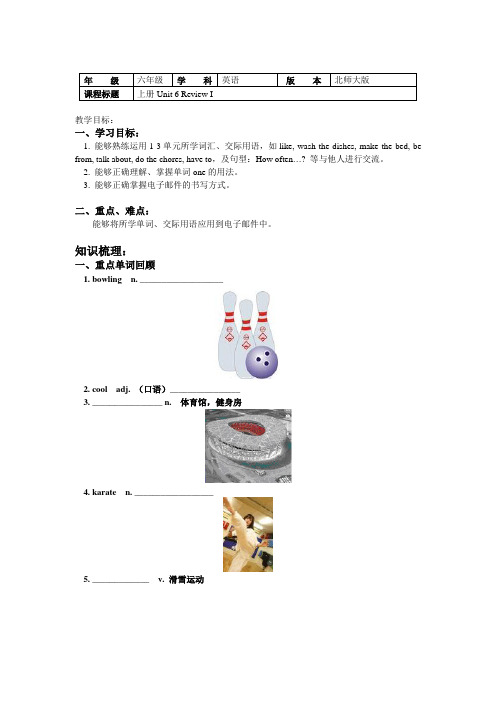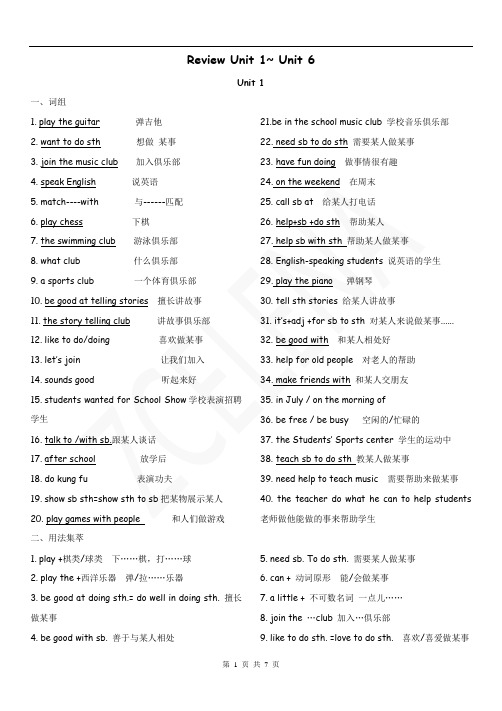unit6review
2019外研版高中英语选择性必修一Unit6 Review课件

Revision
massive/massively massive adj. 大量的;巨大的;厚重的;魁伟的; more massive/ the most massive mass n. 块,团;群众,民众;大量,众多;质量(物理学) 一堆,大量的 a mass of 大规模杀伤性武器 weapons of mass destruction massively adv. 大量地,沉重地,大规模地 1. The explosion made __a_m_a_s_s_iv_e__h_o_le____(一个巨大的坑) in the ground. 2. Astronomers know that the two stars have nearly the same size, __m_a_s_s__(质量),
4. The carvings represent a hunting __sc_e_n_e___.
Revision
disturb disturb v. 打扰;妨碍;使不安;弄乱;使恼怒 disturbing adj 令人不安的; disturbed adj. 不安的,焦虑的 disturbance n. 骚乱,干扰,不稳定 1. The newspaper has revealeded some__d_is_t_u_rb_i_n_g__(disturb) facts. 2. Doctors were __d_i_st_u_r_b_e_d__(disturb) that less than 30 percent of the patients
六年级英语上册知识讲义Unit 6 Review I-北师大版

年级六年级学科英语版本北师大版课程标题上册Unit 6 Review I教学目标:一、学习目标:1. 能够熟练运用1-3单元所学词汇、交际用语,如like, wash the dishes, make the bed, be from, talk about, do the chores, have to,及句型:How often…? 等与他人进行交流。
2. 能够正确理解、掌握单词one的用法。
3. 能够正确掌握电子邮件的书写方式。
二、重点、难点:能够将所学单词、交际用语应用到电子邮件中。
知识梳理:一、重点单词回顾1. bowling n. ___________________2. cool adj. (口语)________________3. ________________ n. 体育馆,健身房4. karate n. __________________5. _____________ v. 滑雪运动6. ________________ adv. 有时7. find v. ___________________8. ____________ v. 滑冰,溜冰9. invitation n. ___________________10. __________ v. 学习11. partner n. ____________rmation n. ___________________13. _____________ n. 家务14. dish n. _______, ________15. _____________ v. 喂养, 饲养16. ______________ n. 家庭作业17. polish v. ____________18. busy adj. ______________19. dust v. _____________20. furniture n. _____________21. _____________ n. 草22. never adv. _____________23. _____________ n. 人(可数名词)24. trash n. ________________答案:1. 保龄球2. 真棒3. gym4. 空手道5. ski6. sometimes7. 发现,找到8. ice-skate9. 邀请函10. study/learn 11. 同伴/搭档12. 信息13. chore 14. 盘子,一盘菜15. feed16. homework 17. 擦亮18. 忙碌的19. 掸去……的灰尘20. 家具21. grass 22. 从不23. person 24. 垃圾【考题链接】找出每组中不同类的单词。
六年级上册英语课件- Unit 6 Review (2)

friends
came
Mary andwKaaste __w_a_n_2te(adre/were) in her dream, too. In her didn't
dreahma,dthey ______3(are/were) in a high jump
competition.
But she ________ 4(can’t/ couldn’t) jump. Kate__________ 5(jump/jumped) very well and she ________6(come/ came) first. Mary ______7(is/ was)
A ●2.( ) What did Mocky do? first.
B ●3.( ) Did Ken win the race?
E
●4.( ) Who was first?
F banana too quickly.
●5.( ) How old are you, Mocky? old.
B A. No, Mocky, he
B. were●( )7. hat ______ Mocky do yesterday?
●
A. do
B. did
Read the questions of A, and choose correct answer of B.
A
C ●1.( ) Where were you yesterday? didn’t. D
●
B
A. first B. one
●( )2. I ______very happy because I won the prize.
●B
A. am B. was
五年级上册英语课件-unit 6 Review 北师大版(三起)(共20张PPT)

Does Ann like cats? Yes ,she does.
Do you have any smaller shoes? Yes ,we do.
Where are my socks? They are on the table.
The T-shirt is on the bed.
The bag is under the table.
The bookstore is next to the hospital.
My name is Harry.
I'm
from the
UK.
(来自英国)
My father is a farmer. He has sheep and horses .
I
a brother.
Those trousers are too big.
Go down the street
actor [ 'æktə ] The post office is next to the train station. The post office is next to the train station.
then turn left.
The T-shirt is on the bed.
Come
me.
Where is the post office?
and
There is a park.
The post office is next to the train station.
Mocky is behind the post office.
on the farm.
Review Unit 1-6

Review Unit 1~ Unit 6Unit 1一、词组1.play the guitar 弹吉他2.want to do sth 想做某事3.join the music club 加入俱乐部4.5.6.7.8.9.20. play games with people 21.be in the school music club 学校音乐俱乐部22. need sb to do sth 需要某人做某事23. have fun doing 做事情很有趣......students二、用法集萃1.play +棋类/球类下……棋,打……球2.play the +西洋乐器弹/拉……乐器3.be good at doing sth.= do well in doing sth. 擅长做某事4.be good with sb. 善于与某人相处5.need sb. To do sth. 需要某人做某事6.can + 动词原形能/会做某事7.a little + 不可数名词一点儿……8.join the …club 加入…俱乐部9.like to do sth. =love to do sth. 喜欢/喜爱做某事三、作文假设你们幼儿园在暑假期间要招聘临时辅导员,请根据下面的条件用英语写一篇60词左右的文章。
要去:1喜欢孩子2会唱歌,画画,使用电脑3工作时间为暑假。
写作思路:招聘职位:Are you good with ….We need… .招聘条件:Can you …, Can you … .call us at 1.11.always /usually/ often/ sometimes/ never12.your radio show 你的广播节目13.from ----to 从哪里到哪里14.at night 在夜晚15.a funny time 一个有趣的时间16.take exercise 锻炼17.be late for 迟到28.get home 到达家29.either-----or 或者----或者30.eat a good breakfast 吃一顿早餐31.lots of /a lot of 许多32.be good for 对------有益33.taste good 尝起来好34.do her homework 做她的家庭作业35.have a healthy life 有一个健康的生活方式二、用法集萃1.at + 具体时间点在几点(几分)2.eat breakfast/ lunch/dinner吃早饭/午饭/晚饭3.thirty\half past +基数词……点半4.fifteen\a quarter to +基数词差一刻到……点5.from …to …从……到……6.needto do sth 需要做某事三、作文描述一天的活动安排注意要使用then , and .after 等词早晨:I usually get up at …Them I have breakfast. At…I go to school.上午下午:We have …in the morning. …in the afternoon. At …I go home.晚上I do my homework …Them I go to bed at…I usually get up 6:30 a.m .Then I have breakfast.At 7:10 am.I go to school .We have four classes in the morning and three classes in the afternoon.At 4:30p.m I go home .After supper., I do my homework. I usually watch TV from 9:00 to 9:30 in the evening .Then I go to bed at 10:00p.mUnit 3一、词组1.get to school 到达学校2.take the train 乘火车3.take the subway 乘地铁4.ride a bike 骑自行车5.how do you get to school 怎么到达学校6.one hundred and five 1057.how far is it 多远8.how long does it take sb to do sth花费某人多长时间做某事9.ten minutes-----how long10.ten minutes’ walk -------how far11.ride the bike to school 骑自行车到学校12.every day 每天13. walk to , drive to ,fly to14. I'm not sure 我不敢确信15. about= around 大约16. 10 kilometers away from 十公里远17. good exercise 好的锻炼18. walk to school 步行去学19. get home 到达家20. drive his car to work 开车去上班21. in his father’s car 坐父亲的车22. need about 10 minutes to get to school 需要十分钟的时间到达学校23. I want to know where Bob lives我想知道鲍勃住到哪24. what do you think of =how do you like 你觉得怎么样25. crossing the river is 穿过河是26. it is easy to get to school=it’s+ adj. +for sb. todo sth. 到达学校很容易27. there is 就近原则28. between----and 在两者之间29. no= not any =not a30. the river run quickly 河水流的快31.quickly 动作上fast 速度上soon时间上32. on a ropeway 在索道上33. go on a ropeway to cross the river 坐索道穿过河34. an 11-year-old boy一个11岁大的男孩35. ten minutes’walk / a ten-minute walk 10分钟的路36. be afraid to do, be afraid of sth / doing害怕做某事37. love to do 喜欢做某事38. be like a father to me 像父亲一样做某事39. leave for . 离开到某地40. leave sth at/ on /in +地点把某物留在某地41. come true 实现42. why not +v原形43. why ------because44. thanks for +n /doing sth为什么而感谢45. how to do it 怎么来做它46. at about 8:00 在大约8点二、用法集萃take…to …= go to …by…乘…去…How do / does (sb)get to …? …是怎样到…的?How far is it from …to …? 从…到…有多远?It takes sb. some time to do sth. 做某事花费某人多长时间。
北师大版(三起)(2024新版)三年级上册英语Unit6 Review教学设计

北师大版(三起)(2024新版)三年级上册英语Unit6Review教学设计一、教学目标知识与技能:复习巩固前三单元(假设为Unit3-Unit5)的重点词汇、句型和语法知识,提高学生的综合语言运用能力。
过程与方法:通过多样化的复习活动,如游戏、竞赛、角色扮演等,激发学生的学习兴趣,促进知识的迁移和应用。
情感态度与价值观:培养学生的自信心和合作精神,鼓励他们在复习过程中相互帮助,共同进步。
二、教学内容分析Unit6 Review作为本册书的复习单元,旨在综合回顾和巩固前三单元(假设为Unit3-Unit5)的学习内容。
这些单元可能涵盖了颜色、数字、家庭成员、职业、家庭环境等多个主题,涉及的基本词汇、句型和语法知识丰富多样。
因此,本单元的教学重点是帮助学生梳理和整合这些知识点,形成系统的知识体系,并能在实际情境中灵活运用。
三、学情分析经过前三单元的学习,三年级学生已经积累了一定的英语词汇量和基本的语法知识,能够进行简单的日常对话和描述。
然而,由于学生之间的个体差异和学习能力的不同,部分学生在某些知识点上可能存在掌握不牢固或遗忘的情况。
因此,在复习过程中,教师需要关注学生的个体差异,采用分层教学和差异化教学策略,确保每个学生都能在原有基础上得到提升。
四、教学方法与手段情境教学法:创设贴近学生生活的真实情境,让学生在情境中复习和运用所学知识。
游戏竞赛法:设计趣味性强的游戏和竞赛活动,激发学生的学习兴趣和参与度。
小组合作学习:组织学生分组合作,共同完成复习任务,培养学生的合作精神和团队协作能力。
多媒体辅助教学:利用PPT、视频等多媒体资源,丰富教学手段,提高教学效果。
五、教学重难点教学重点:复习巩固前三单元的重点词汇、句型和语法知识,提高学生的综合语言运用能力。
教学难点:帮助学生梳理和整合知识点,形成系统的知识体系,并能在实际情境中灵活运用所学知识。
六、教学过程Step 1: Warm-up(热身活动)Greetings and Review Song:教师与学生进行日常问候,并播放一首包含前三单元词汇和句型的英文歌曲,让学生跟唱,活跃课堂气氛,同时复习旧知。
北师大版Unit6_Review教学课件(1)

Presentation
Let’s review
They went to the museum.
They saw a photo of Yang Liwei. 一般过去时:主语+v.ed+其它.
Presentation、最高级
The red train is longer Tom is taller than Jerry.
than the blue train.
A+be+比较级+than+B.
Presentation
Let’s review
形容词比较级、最高级
The red bag is the biggest. The elephant is the heaviest.
A+be+the+最高级.
Practice
Let’s practice
( )1 How much did you weigh last year?
( )2 Did you like the movie yesterday?
( )3 Were you at school last Friday?
( )4 Who’s the tallest in your family?
He walked on the moon and took photos. Question 3: Who was the first Chinese man
in space?
Yang Liwei.
Presentation
Let’s review
It was XXXday yesterday. We were in the spaceship. 一般过去时:主语+was/were+其它.
牛津译林版七年级英语上册Unit6 Revision 复习课件

8.胡萝卜 carrot
9.猪肉
pork
10.糖果;甜s点weet
11127908....牙 电 可 水乐 池齿 脑(游饮 ,复戏料 水) 塘cgcpoooammloalpeuter
21.游泳池 spwooiml ming
基础过关
词 汇篇
n2222224563. .....块 玻 盘 盐 茶杯璃子(片杯,,;杯张玻,璃件pgpsc.auill.eaa.lp)tcstees
19.我喜欢汉堡包, 但他们不健康。
I like __h_a_m__b_u_r_g_er_s____ but they are not
menu
Tell1m. ehmeaolrtehyfo(r名m词s o)f t(he同fo义llowing words:
词)
health
fit
2. good(副词)(反义词)
well
bad
3. hungry(反义词) full
4. plan(现在分词) planning
5. little(比较级)
less
tomatoes
肉类
meat
…gives me a lot of energy . I love/like/dislike/hate it
chicken
pork
beef
fish
零食
snacks
I like/dislike … . It’s/they’re not healthy .
chips sweets
4.Eating fruit and _v_e_g_e_t_a_b_le_s_(蔬菜) is good for people's health.
5.Eddie _s_e_l_d_o_m_(很少)__e_x_e_rc_i_se_s__(锻炼).
- 1、下载文档前请自行甄别文档内容的完整性,平台不提供额外的编辑、内容补充、找答案等附加服务。
- 2、"仅部分预览"的文档,不可在线预览部分如存在完整性等问题,可反馈申请退款(可完整预览的文档不适用该条件!)。
- 3、如文档侵犯您的权益,请联系客服反馈,我们会尽快为您处理(人工客服工作时间:9:00-18:30)。
Picture ten
Page 62
• Hello! My name’s Bobby Bear. 你好! 我的名字叫Bobby熊。 • What’s your name? 你叫什么名字? • My name’s Tommy.我的名字叫Tommy。 • Who’s he? 他是谁? • He’s my friend. His name’s Ken. • 他是我的朋友。 他的名字是 Ken。 • That’s his family. 那是他的家庭。
Notice 注意
• Who’s he? • He’s my father/grandfather/uncle/brother. • Who’s she? She’s my mother/grandmother/aunt/sister. • He/he his • She/she her • me my
Notice 注意
• father/grandfather/uncle/brother. • mother/grandmother/aunt/sister. • He/he his 他 他的 • She/she her 她 她的 my • me 我 我的
Homework
• 1 熟读课文,单词 bear 熊 • 2 订正 伴你成长 3 课本65页、70页、71页 72页
Page 63
• This is Ann. Ken is her brother. Hello, Ann. 这是Ann 。 Ken是她的哥哥。你好, Ann。 That’s her sister. Her name’s Kate. 那是她的姐姐。 她的名字叫Kate。 • Who’s he? He’s my father. 他是谁? 他是我的父亲。 • This isn’t my mother. This is my aunt. • 这不是我的母亲。这是我的婶/姑/姨 That’s my family. 那是我的家庭。
Unit 6 Review
Picture two
Picture three
Picture fure five
Picture six
Picture six
Picture seven
Picture eight
Picture eight
Picture nine
